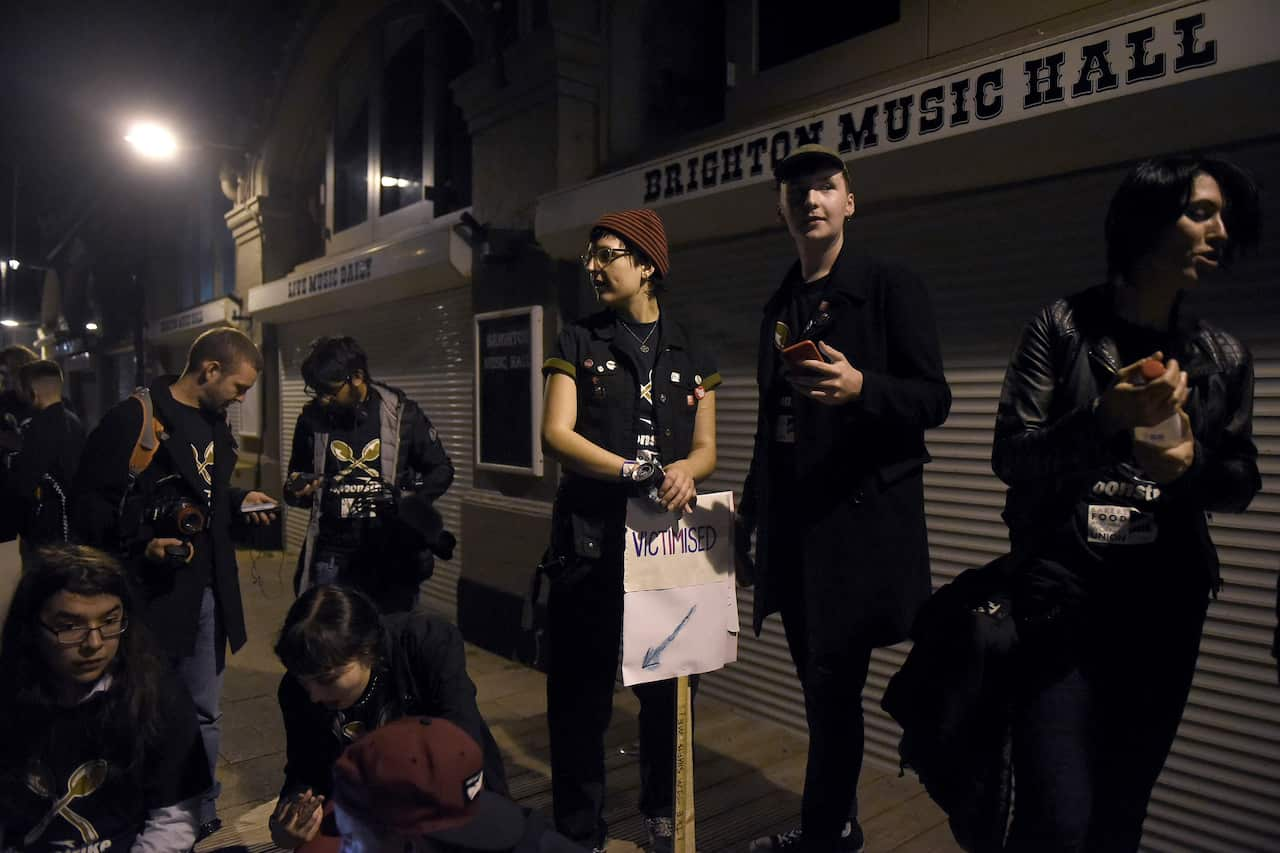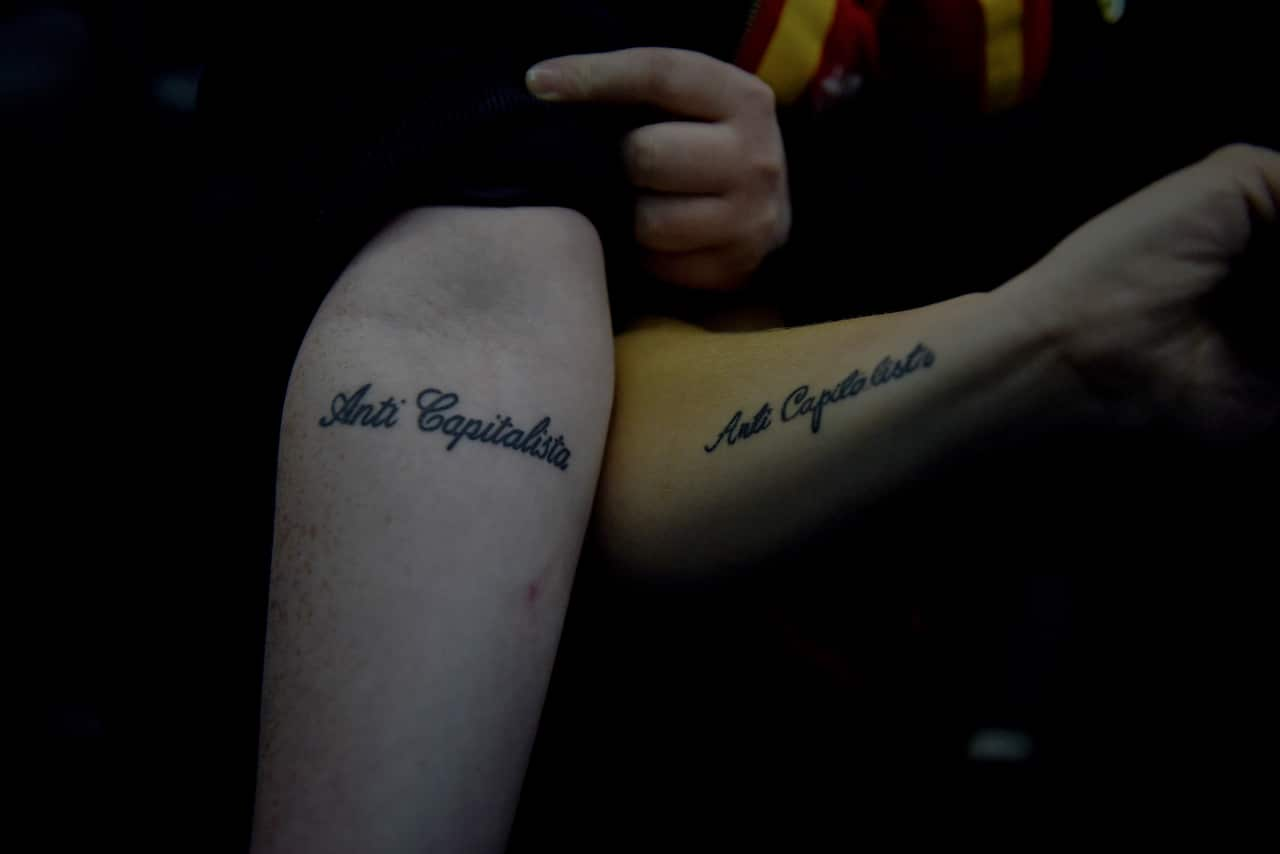Above: How politics divided Britain. Watch more here.
Alex McIntyre was raised on budget cuts.
The youth centre where he went after school was shuttered when he was 10. When he was 11, his mother’s housing benefit was shaved away, a casualty of the Welfare Reform Act. By the time the streetlight in his cul-de-sac began blinking off at midnight a few years later, these events had knitted together into a single story, about a government policy that had defined his childhood.
“Austerity, that’s what I know, that’s my life,” McIntyre said. “I’ve never known an England that was a different way.”
Now 19 and old enough to vote, McIntyre is making up for lost time. Over the last six months, he was drawn into the centre of the Momentum movement, an ideological marketplace buzzing with rebranded socialism and trade unionism. His parents may have gotten their news from The Sun and The Daily Mail, but he listens to reports on the “crisis of capitalism” from Novara Media, a left-wing independent media group. Over Christmas he started reading Marx.
McIntyre is the first in his family to attend college, part of a vast cohort of young Britons that was meant to embody upward social mobility. It is a paradox that so many in this bulge, like their counterparts in the United States, are giving up on free-market capitalism, convinced it cannot provide their families with a decent life.
The general election of 2017 exposed the starkest generation gap in the recent history of British politics. Young voters broke dramatically for the Labour Party, whose socialist leader, Jeremy Corbyn, has promised to rebuild the welfare state and redistribute wealth. Hardened against the centrists of their parents’ generation, they have tugged the party to the left, opening up rifts that are now fracturing Labour.
The young also saw their views on exiting the European Union — three-quarters of them voted to Remain — bulldozed by Leavers their grandparents’ age. McIntyre is still angry that he was too young, by a year, to vote in that 2016 referendum. He is pale and lanky, discreetly tattooed, caustically funny and so well-mannered that he would rather miss his train than cut into a line. (“Being British can be limiting,” he observed.)

He is not representative of a generation. But his grievance is generational: that the state has taken away benefits his parents and grandparents enjoyed, like low-cost housing and free education.
“We’re not blind to it. We’re not stupid, you know,” McIntyre said. “The reason we’re opposing what’s going on, is what we’ve been dealt.”
Britons who came of age in the wake of the global financial crisis of 2008 will, in many cases, be worse off than their parents. Born on the wrong side of skyrocketing property values, 30-year-olds are only half as likely to own homes as baby boomers were at the same age. A third are expected to rent for their whole lives.
Unlike previous generations, they are expected to foot the bill for an expensive education. The average graduate now owes the government more than 50,800 pounds, or $93,000AUD, a debt to be paid back gradually upon securing a well-paid job, according to the Institute for Fiscal Studies. The portion of Britons attending college has climbed to 49 percent, the highest level ever, but they will graduate into a historic spell of wage stagnation.
Robert Ford, a professor of politics at the University of Manchester, recalled Margaret Thatcher’s thesis about homeownership: By allowing low-income Britons to buy the state housing they rented, she could make them into stakeholders in market capitalism, enlarging the Tory Party. With his students, realising in their 20s that they are not likely ever to own a home, that process has been thrown into reverse.
“All the risk has been shifted onto them,” he said. “They know this is not the situation their parents and grandparents were in. You’ve got a generation since the crisis with lower mobility and lower security. It makes them less convinced that the market delivers good outcomes.”
It was a big deal for Alex McIntyre to make it to college.
He comes from a lower-middle-class neighbourhood of Welwyn Garden City, north of London, one where life expectancy trails the national average. He grew up in a state-subsidised rental property and attended a school ranked “Requires Improvement” by the state educational inspection agency. His sister had her first child at 16.
Social mobility was a mantra for the Conservative Party during those years. David Cameron promised this in 2010, as he announced the tripling of university tuition fees. Higher fees, he argued, would open up new spots and create better opportunities by encouraging market competition, something closer to the American system.
“We have made our choice,” Cameron said. “A choice in favour of social mobility, in favour of a fairer society. Of a country where you can escape — truly escape — the circumstances of your birth.”
McIntyre was a test case for this experiment. He was identified as gifted and enrolled in a charity program, the Social Mobility Foundation. He was sent to stay at Cambridge University, where he ate in a wood-panelled dining hall, served by waiters, an experience he described as “hilarious.” He thrilled his mother by saying he wanted to become a doctor.
But once he arrived at the University of Brighton, that confidence collapsed. Rents in Brighton rose faster than anywhere else in England last year, according to Hamptons International, a rental agent. The room he found, at the top of a musty, water-stained stairway, cost more than his government maintenance loan could cover. When he added up his tuition and maintenance loans, the amount he will repay the government once he is in a secure job, it came to 46,500 pounds, or roughly $61,000. His anxiety was so intense that he tried to get an appointment for medication.
“It’s that feeling of having absolutely nothing which I don’t want to even go near,” he said.
The panic eased when he found a job as a kitchen assistant at a J.D. Wetherspoon pub. Wetherspoons is Britain’s ubiquitous low-cost restaurant chain, like Applebee’s, but with pints of ale. Its founder, a bluff self-made millionaire named Tim Martin, is an American-style celebrity entrepreneur who counts Walmart’s Sam Walton among his heroes.
A few months later, McIntyre strode out on to North Street for his first walkout, accompanied by their union rep from the Bakers, Food and Allied Workers Union, demanding a minimum wage of 10 pounds an hour. The strikers looked nothing like the coal miners of the 1980s printed on Britain’s collective memory; they were sons and daughters of the middle class, wearing wallet chains and leopard skin pants and Doc Martens. “You are already trending, No. 6 on Twitter,” whooped the union rep. “Solidarity from Plovdiv, Bulgaria!” someone shouted.

Afterward, McIntyre was so exhilarated that he barely slept. “I’m sitting here with a cup of coffee, thinking, ‘What just happened?'” he said a little later. “This is not the end. It is the first step in something big.”
He had passed into the world of the young left that has coalesced in Brighton, a bohemian university town. It is a world of anti-capitalist workshops, anarchist retreats, “red gyms” and rent strikes, and it is embodied by Corbyn, 69, a grandfatherly socialist who was dismissed as an anachronism during the centrist era of Tony Blair and Bill Clinton.
McIntyre wasn’t certain where he stood on Marx, but he did feel at home with the trade union guys. A future was taking shape in McIntyre’s mind, complete with new friends and new ideas — the thing, in other words, that college had been supposed to provide.
He wasn’t sure, anymore, about going into medicine. He called his mother one day to give her this news.
“I thought I wanted to be a scientist, but I love politics,” he said later. “There are amazing opportunities with the bakers’ union.”
He was, he acknowledged, of two minds, having invested so many years in preparing for college. “I’ve accrued half the debt, it would be quite dumb of me to completely abandon what I’ve worked years for,” he said. “On the other hand, my passion for what I do at uni has dwindled.”
She listened to him quietly and hung up the phone, he said. A single mother, she had worked two or three jobs the whole time he was growing up and still takes in ironing for extra cash. His applications to college had been thrilling for her, and she went through the choices with him, one by one.
“She wants me to have a better future,” he said. “For her, that is going to university, getting a degree, earning loads of money.”
The next day she called to tell him to stay in school. He said he would.
At home for the holidays, he was warned not to discuss politics with his Thatcherite grandparents, and tiptoed around the subject. No one in his life has brought up the bitter, divisive strikes of the 1970s and ‘80s, which soured public opinion against the labor movement.
“Either they are left-wing or they aren’t political at all,” he said. “That’s young people. That’s us.”
Dateline is an award-winning Australian, international documentary series airing for over 40 years. Each week Dateline scours the globe to bring you a world of daring stories. Read more about Dateline
Have a story or comment? Contact Us


